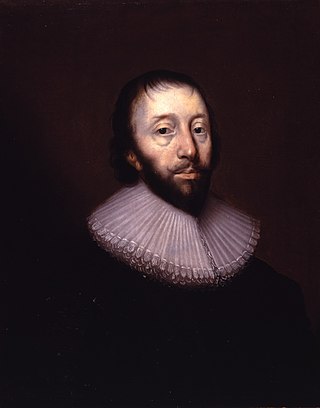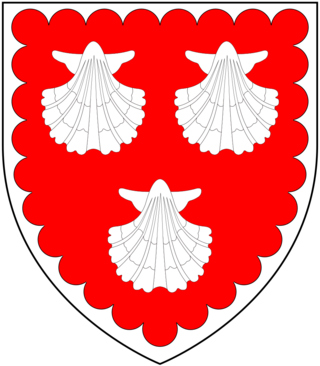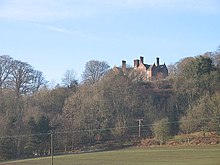
The Oxford Parliament, also known as the Mongrel Parliament, was the Parliament assembled by Charles I of England for the first time on 22 January 1644 and adjourned for the last time on 10 March 1645, with the purpose of being an instrument of the Royalist war campaign.

Sir Dudley Digges was an English diplomat and politician who sat in the House of Commons between 1610 and 1629. Digges was also a "Virginia adventurer," an investor who ventured his capital in the Virginia Company of London; his son Edward Digges would go on to be Governor of Virginia. Dudley Digges was responsible for the rebuilding of Chilham Castle, completed in around 1616.

Arthur Goodwin of Upper Winchendon, Buckinghamshire was an English lawyer and politician who sat in the House of Commons at various times between 1621 and 1643. He supported the Parliamentary cause during the English Civil War.

Sir John Glynne KS was a Welsh lawyer of the Commonwealth and Restoration periods, who rose to become Lord Chief Justice of the Upper Bench, under Oliver Cromwell. He sat in the House of Commons at various times between 1640 and 1660.
Samuel Dunch (1593–1668) was an English politician who sat in the House of Commons in 1621 and 1653.

Sir John Glanville the younger, was an English politician who sat in the House of Commons at various times between 1614 and 1644. He was Speaker of the English House of Commons during the Short Parliament. He supported the Royalist cause in the English Civil War.

Sir Walter Erle or Earle was an English landowner and politician who sat in the House of Commons at various times between 1614 and 1648. He was a vigorous opponent of King Charles I in the Parliamentary cause both before and during the English Civil War.
Sir Thomas Grantham was an English politician who sat in the House of Commons from 1604 to 1629.
Sir Francis Knollys of Reading Abbey, Berkshire was an English privateer and politician who sat in the House of Commons at various times between 1575 and 1648.
Sir Francis Knollys (1592–1643) was an English politician who sat in the House of Commons variously between 1624 and 1643.

Sir Robert Croke was an English lawyer and politician who sat in the House of Commons between 1640 and 1643.
Sir Henry Compton KB was an English politician who sat in the House of Commons at various times between 1601 and 1640.
John Griffith was a Welsh politician who sat in the House of Commons at various times between 1621 and 1642.
Sir Henry Anderson (1582–1659) was an English Royalist landowner and politician who represented Newcastle-upon-Tyne once as Mayor and twice as MP in the House of Commons between 1614 and 1643 and was also High Sheriff of Northumberland.
Sir Thomas Holt was an English lawyer and politician who sat in the House of Commons in 1654 and 1656.
Sir Samuel Baldwyn was an English lawyer and politician who sat in the House of Commons in 1659.
Robert Delaval was an English politician who sat in the House of Commons in 1659.
Richard Amhurst was an English lawyer and politician who sat in the House of Commons between 1614 and 1622.
Richard Lowther was an English lawyer and politician who sat in the House of Commons in 1640.
Henry Bayntun (1621–1672) was an English politician who sat in the House of Commons between 1661 and 1672.







